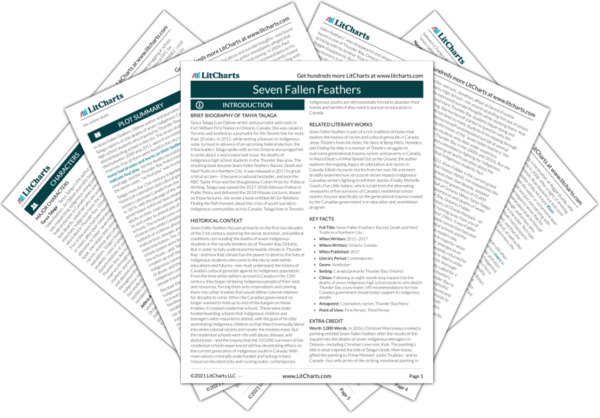Colonialism, Cultural Genocide, and Racism
At the beginning of Seven Fallen Feathers, author Tanya Talaga cites a report from the Truth and Reconciliation Commission of Canada that defines “cultural genocide” as “the destruction of those structures and practices that allow the group to continue as a group.” By destroying a cultural, ethnic, or religious group’s institutions, seizing their land and artifacts, or barring their languages and traditions, a colonizing force can effectively destroy a colonized group of people. The…
read analysis of Colonialism, Cultural Genocide, and RacismGenerational Trauma and Circular Suffering
Canada developed residential schools in order to assimilate Indigenous children into white Canadian society so that the Canadian government wouldn’t have to honor the treaties they’d signed with Canada’s First Nations in the 18th and 19th centuries. These schools were notorious sites of abuse. Indigenous students were rounded up from their reservations, cut off from their communities, and placed in schools where they were forced to abandon their identities. The children were used in medical…
read analysis of Generational Trauma and Circular SufferingIndigenous Youth, Education Reform, and Support Networks
Throughout the 2000s and 2010s, seven Indigenous Canadian youths (the titular “seven fallen feathers”) died while attending Dennis Franklin Cromarty High School in Thunder Bay, Ontario. These youths became boarding school students Dennis Franklin Cromarty in order to try to pursue an education and improve their future prospects. But in going to the school, these children were cut off from their homes and families. Between feeling homesick, being removed from their cultures, and experiencing a…
read analysis of Indigenous Youth, Education Reform, and Support Networks
Tradition, Prophecy, Spirituality, and Hope
At the beginning of Seven Fallen Feathers, author Tanya Talaga discusses the prophecy of the seven fires, which outlines seven key time periods in the history of North America’s Indigenous people. Toward the end of the book, Nishnawbe Aski Nation grand chief Alvin Fiddler speaks of an “eighth fire”—the reconciliation and mutual advancement of white settlers and Indigenous people. Though centuries of cultural genocide and systemic racism have threatened to destroy Indigenous cultures, Talaga…
read analysis of Tradition, Prophecy, Spirituality, and Hope






